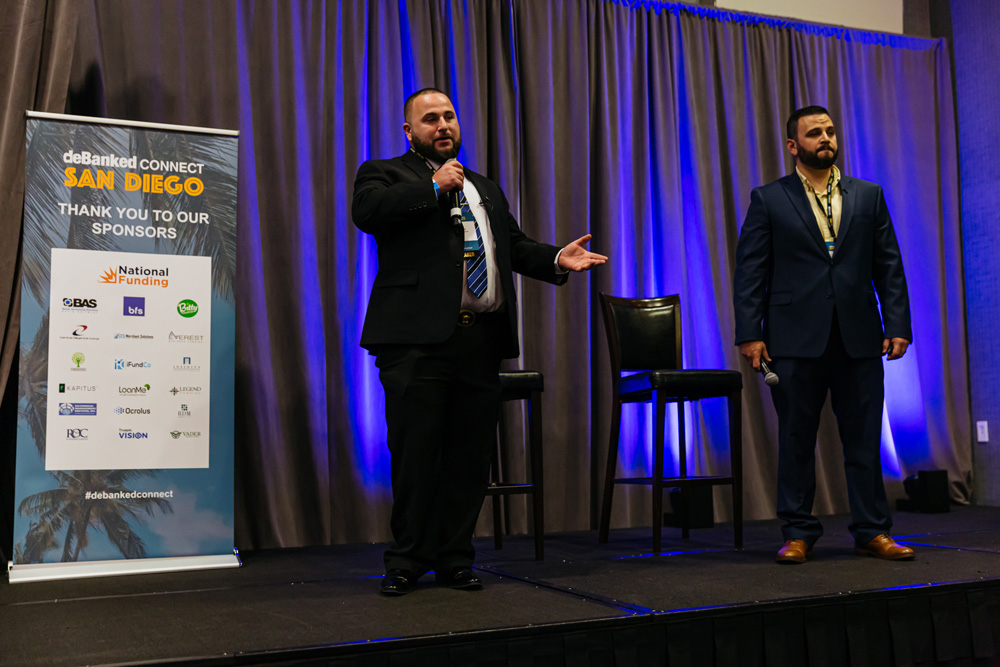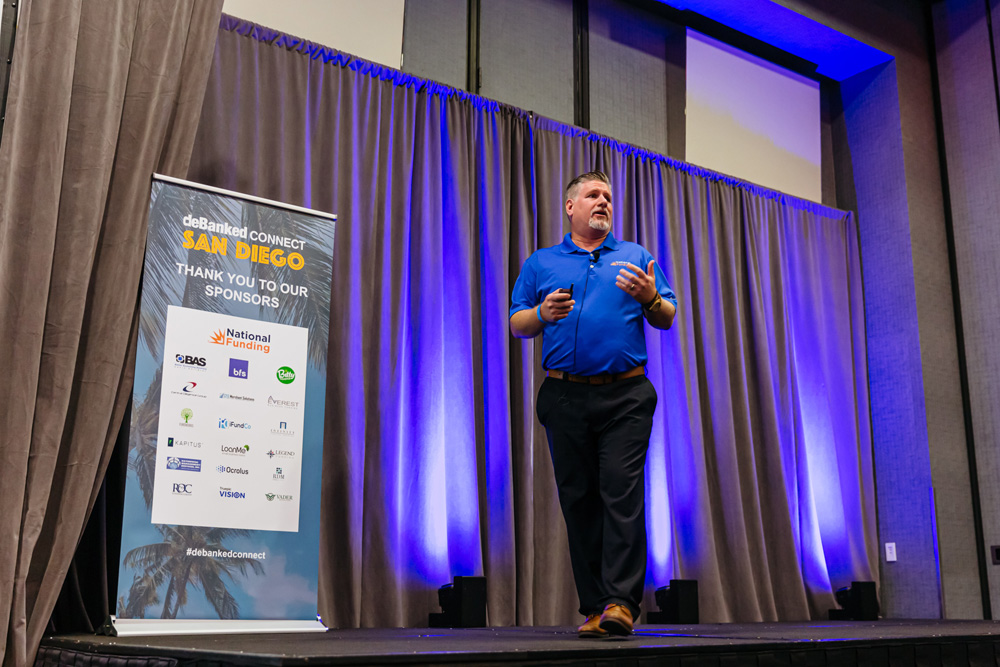Archive for 2019
Lenders, Leaders, and Las Vegas: Money20/20 Review
November 3, 2019 Two things arrived in Las Vegas last month: the first being an unusual dip in local weather, with temperatures dropping to the low forties at times and woolen hats making an appearance; the second being Money20/20.
Two things arrived in Las Vegas last month: the first being an unusual dip in local weather, with temperatures dropping to the low forties at times and woolen hats making an appearance; the second being Money20/20.
Now in its seventh year, the conference runs smoothly to the point of being habitual, a trait several attendees mentioned to me when asked how they felt about the 2019 edition.
Running from Sunday the 27thto Wednesday the 30th, each day offered a different focus. The first of these being alternative finance, blockchains, and cryptos. Here, leaders from LendingClub, Kabbage, and OnDeck, among others, took to the stages to discuss issues ranging from strategies in the face of a recession to AI in lending. Running throughout were conversations about where cannabis banking regulation was headed and what can be done to prepare. Of note was Jontae James of NatureTrak, who spoke from the Leadership Lodge Stage, pitching his company as a solution to compliance issues facing lenders who want to work with cannabis companies.
The following days contained a mix of subjects, with Monday featuring many events relating to payments and entrepreneurship; Tuesday being the day for cybersecurity, regulation, and banking; and Wednesday closing the show with various talks on emerging technologies. Among the highlights of these were a talk from David Marcus of Calibra on the currency’s efforts to alter the financial landscape, a discussion on growth in emerging markets from Ant Financial’s Douglas Feagin, and words from BlueVine’s Eyal Lifshitz on the needs of small businesses.
 Outside of the stages where these were held was the main expo hall. Dotted with booths and stands, the narrow pathways that were carved out by these were lined with a mix of businesses.
Outside of the stages where these were held was the main expo hall. Dotted with booths and stands, the narrow pathways that were carved out by these were lined with a mix of businesses.
In overwhelming numbers though were companies offering identity verification services. A growing industry in today’s increasingly online world, their presence dominated the hall, with it being hard to turn around without being offered a pamphlet on the importance of knowing who your customers are and how much it will cost to confirm their existence and authenticity.
And while walking through the hall and stopping at stalls to talk offered pleasant and informative conversation, there was an underlying tenseness to some of the chatting. Perhaps it was the unrelenting air conditioning that caused this? Or the endless stream of coffee available had rattled some nerve endings? Or maybe it was the frequency with which an oncoming recession was referenced in the titles of talks?
Who knows, what is likely though is that if it is the last of these possibilities, in the case of a “looming crisis,” as one event labelled it, what was talked about in Vegas may not stay in Vegas.
Canadian Lenders Summit To Take Place on Nov 20, 2019 in Toronto
November 2, 2019The annual Canadian Lenders Summit produced by the Canadian Lenders Association will take place on November 20th in Toronto. Registrants can use promo code: debanked40 for 40% off the ticket price.
deBanked CONNECT San Diego Is A Hit
November 1, 2019 Under the California sun, our most recent CONNECT event kicked off last week in San Diego’s Hard Rock Hotel. Home to Ron Burgundy, we were a few days too early in the city for any sex panther cologne-infused costumes to make an appearance, although that didn’t stop one attendee donning a money-clad suit.
Under the California sun, our most recent CONNECT event kicked off last week in San Diego’s Hard Rock Hotel. Home to Ron Burgundy, we were a few days too early in the city for any sex panther cologne-infused costumes to make an appearance, although that didn’t stop one attendee donning a money-clad suit.
Beginning in the afternoon, event-goers were able to choose between starting the day with a session from Will Murphy and Josh Feinberg on their Equipment Broker School, a program that aims to arm participants with the knowledge to enter the equipment financing scene; or to dive straight into networking.

Following this, deBanked President and Chief Editor Sean Murray delivered an introductory speech laden with his disappointment in the New York Yankees, a gloom that revealed to him a particular silver lining: “if you’re going to lose, make sure you lose to the best.” Embracing it as a mantra, Murray encouraged brokers to carry out their dealings at the event with this perspective in mind, before expounding on what the future of the industry may hold.

Next up was Justin Thompson, CRO of National Funding, who spoke on the importance of building relationships, providing customers with options, and getting “hooks” into customers in order to plan for your company in the long term. A message that led into the proceeding discussion involving leaders from LoanMe, BFS Capital, and Ocrolus on how businesses are leveraging technology to improve their standing in the market and ensure longevity.

And concluding this panel was a ticket giveaway for the upcoming deBanked Miami event in January, which saw four winners pull a guitar pick from under their seat in a musical chairs-inspired take on Willy Wonka.
Closing out the show were a conversation about California’s unique licensing requirements and what one needs to be aware of when striving for legal compliance; and a series of tech demos showcasing a range of verification software from Truepic, Ocrolus, and Nationwide Management Services.

Left with naught to do but enjoy the rest of the evening, the remainder of the sunshine set on the Hard Rock’s outdoor Woodstock area, where food, drinks, and (mostly) poorly played drums were available to the attendees.
With the atmosphere being breezy and the conversation being comfortable, we left California happy. All that’s really left to say is until next time, you stay classy, San Diego.
Knight Capital Has Been Acquired
November 1, 2019 Publicly-traded Ready Capital Corporation has acquired 100% of Knight Capital LLC. The total sales price was undisclosed but it consisted of cash and 658,771 common shares of Ready Capital stock. A share currently trades at $15.83, valuing the stock portion in excess of $10 million.
Publicly-traded Ready Capital Corporation has acquired 100% of Knight Capital LLC. The total sales price was undisclosed but it consisted of cash and 658,771 common shares of Ready Capital stock. A share currently trades at $15.83, valuing the stock portion in excess of $10 million.
More details may emerge when Ready Capital publishes quarterly earnings next week.
“The acquisition of Knight Capital expands Ready Capital’s product offering to small businesses and does so on a platform that has achieved scale,” said Tom Capasse, Ready Capital’s Chairman and Chief Executive Officer, in a public statement. “Furthermore, the addition of Knight Capital will allow us to leverage its proprietary technology to further increase the efficiency of Ready Capital’s lending platform, enhance our borrowers’ experience and expand existing customer acquisition channels.”
Ready Capital, a multi-strategy real estate finance company, is better known by its management company, Waterfall Asset Management, LLC. Waterfall has previously provided credit facilities to companies like OnDeck, Fundation, and UK-based Lendable.
Ready Capital is headquartered in New York City and employs 400 lending professionals nationwide.
Direct Lending Investments’ Ability to Collect From Largest Debtor Looks Uncertain
October 30, 2019 When Direct Lending Investments (DLI), one of the largest online lending hedge funds, went bust, many were surprised to learn that the fund had discreetly gambled heavily in the international telecom market.
When Direct Lending Investments (DLI), one of the largest online lending hedge funds, went bust, many were surprised to learn that the fund had discreetly gambled heavily in the international telecom market.
At present, a company called VOIP Guardian Partners I owes DLI $203 million. There’s a problem with recovery in that VOIP declared Chapter 7 bankruptcy this past March with little hope to repay because it itself re-loaned out DLI’s funds to telecom companies around the world and were supposedly never paid back.
VOIP is wholly owned by an individual named Rodney Omanoff, a former Hollywood talent agent. There is currently a criminal investigation into Omanoff for money laundering and “other criminal claims,” DLI’s receiver stated in a recent October report. Tens of millions of dollars potentially recoverable by DLI from VOIP are currently in the custody of The Netherlands while the investigation is being conducted.
Meanwhile, deBanked previously determined that VOIP had made bad loans of $158 million to companies purportedly in Hong Kong and United Arab Emirates, funds that came from DLI. The websites for both companies, Telacme Ltd. and Najd Technologies, Ltd, have gone offline.
The bizarre telecom investments in what was perceived to be a hedge fund focused almost entirely on the US online lending market, are not alone. DLI recently revealed that it also loaned millions to a company that put up the mineral rights for 6 oil and gas wells as collateral. It also loaned more than $25 million against a distressed commercial real estate property and a note backed by a VC investment in a cloud-based billing service company.
DLI’s receiver is not confident that it will collect the par amount of receivables on its books.
“Without providing individualized loan/portfolio assessments, the Receiver’s general assessment as of the date of this Report is that recoveries on the remaining loan/investment portfolio are likely to be far less than the $672.5 million in par value stated on the receivership books and records as of September 30, 2019. In fact, in connection with the filing of the 2018 tax returns the Receiver recorded a write down for tax purposes in the approximate amount of 40% of the par value of assets at December 31, 2018.”
Separately, the receiver wrote that most of DLI’s outstanding loan and investment portfolios are in “some form of financial distress or subject to disputes that may affect the timing and extent of recoveries on those portfolios.” It has attempted to keep the identity of those investments confidential so as not to cause any outside interference in those companies’ ability to repay.
Shopify Capital Originated $141M Of Loans And MCAs In Q3, Says It’s a Meaningful Part Of The Shopify Business
October 29, 2019 Shopify Capital, Shopify’s small business funding division, originated $141 million in loans and merchant cash advances last quarter, an 85% increase over Q3 last year.
Shopify Capital, Shopify’s small business funding division, originated $141 million in loans and merchant cash advances last quarter, an 85% increase over Q3 last year.
The company has now cumulatively originated $768.9M since it began funding in April 2016.
On the earnings call, Shopify COO Harley Finkelstein commented on the company’s recent initiative to fund non-Shopify payment merchants by saying that “while it’s still early, we’re seeing strong adoption from those merchants.”
“We started Shopify Capital to help solve another playing field for entrepreneurs, access to capital to grow their businesses,” he explained. “This is especially true as merchants gear up for their busiest selling season of the year.”
When asked about how funding would play a role in the company’s long term expansion and retention plans, Finkelstein said the following:
[P]art of this is making sure that we have merchants in the entirety of their journey to success, certainly things like having additional cash for things like inventory and marketing are very important to them. And there’s not too many place to get that with capital. So we think we’re helping merchants by doing this. It also serves of course as a way to retain merchants because we’re not only now their e-commerce platform or the point sale provider or the payments provider, we’re also now in some cases playing the role of their capital provider.
So this is a meaningful part of our business, and it keeps growing, and it’s certainly something we’re very proud of. And in terms of managing the risk, it’s something we keep a close eye on. We do a ton of trade forecasting and ensuring that we look at the data to update our models as we see trends changing. That being said, it’s important to remember that most of the capital that we put out there is insured by our partner EDC.
So we think that we continue to grow the capital business at the same time manage the risk and so we’re not doing anything that is outside of that loss ratio and risk exposure comfort zone that we think we have right now.
Shopify CEO Tobi Lutke later added how their Capital division adds to their Gross Merchandise Value (GMV) because merchants use funds to build their businesses.”What happens is a lot more businesses, that otherwise would not have access to loans get them and therefore actually continue building their business.”
Become Closes Series A with $12.5 Million
October 29, 2019 Become, formerly known as Lending Express, has finished its Series A funding round with $10 million having been raised from Benson Oak Ventures and Magenta Venture Partners, among others, as well as an additional $2.5 million in venture debt from Viola Credit.
Become, formerly known as Lending Express, has finished its Series A funding round with $10 million having been raised from Benson Oak Ventures and Magenta Venture Partners, among others, as well as an additional $2.5 million in venture debt from Viola Credit.
“We strongly believe it is time to disrupt conventional and ‘alternative’ lending practices,” said Become’s CEO and Co-founder Eden Amirav in a press release. “Become’s technology provides SMBs with the transparency and insights they need to improve their unique financial profiles to attract legitimate funders. This creates a new market for alternative lenders and opens opportunities for formerly ‘unfundable’ SMBs to be bigger, better and [sic] more successful. This funding will allow us to expand our global reach and change the industry for the better, as we ensure that every business that deserves funding has the tools to make it happen.”
The technologies being referred to here are Become’s LendingScoreTM, an analytics program that uses a host of variables to determine businesses’ chances of funding; and their new online marketplace that was launched last month.
Marketed as “Expedia for loans,” the marketplace allows all players in the alternative funding ecosystem, be they funders, brokers, or small business owners, to carry out their functions in one place. The draw being that all processes, such as the looking around for funders, the application for funds, and the approval, can be done through the marketplace. Beyond this, Amirav told deBanked that Become’s systems monitors the performance of those businesses who have signed up to the marketplace and makes recommendations of when to apply for funds, as well as how much to apply for, based on the data they accrue.
“There’s nothing like this in small business. The idea is to give small businesses the power, instead of sending them to lenders, where they’re applying for funding and each application hurts their credit score,” asserted Amirav. “Until today the only ways businesses would get money would be to go out and beg lenders. But now we’re giving the businesses the power.”
BlueVine to Enter Banking in 2020
October 28, 2019 BlueVine Capital, the Redwood City-based alternative funder, has announced today that it will launch its BlueVine Business Banking product in 2020, which will offer checking accounts that come with debit Mastercards, checks, and ATM access exclusively to small businesses. And just like many of the new competitors in the banking space, BlueVine Business Banking will be app-based, with access also being available through an online dashboard.
BlueVine Capital, the Redwood City-based alternative funder, has announced today that it will launch its BlueVine Business Banking product in 2020, which will offer checking accounts that come with debit Mastercards, checks, and ATM access exclusively to small businesses. And just like many of the new competitors in the banking space, BlueVine Business Banking will be app-based, with access also being available through an online dashboard.
With the financial infrastructure and regulatory framework being provided by The Bancorp Bank, BlueVine is the next alternative finance company to look toward becoming a bank, a move which has proven difficult for companies who already tried, such as SoFi and Square.
“Historically, banks have under-invested in small businesses and as a result, small businesses have been left with products and services that don’t meet their needs,” said BlueVine CEO and Co-founder Eyal Lifshitz in a press release that claims only 9% of small businesses believe their banks meet all of their needs. “Credit is a core part of banking and with the addition of checking accounts to our existing suite of financing products, customers can have a truly seamless banking experience.”
Such seamlessness spawns from BlueVine’s goal to promote an integrated and instant banking model, Lifshitz told me. “No more waiting for ACH for two days, or for wires to come in. You press a button, you draw from your line of credit, and magically it’s in your checking account … It’s the way that we believe it should be. The fact that it’s not currently like this is incredible in our eyes. This is what we believe the future looks like.”
BlueVine Business Banking will offer customers 1.00% interest rates on their savings and aims to cut out many of the fees associated with checking accounts, as Lifshitz explained that there will be no monthly, excess, or ACH charges; and that wire fees will be a fraction of what they cost with traditional banks.
“We feel we have the ability to build a true small business bank. Finally, one that is built and designed for small businesses rather than one that is having them as the third or fourth priority on the list, which many of the larger banks do … We believe the reason we’re here providing alternative finance is because banking is broken, and our goal is to build better banking, not just financing, but overall better banking.”






























